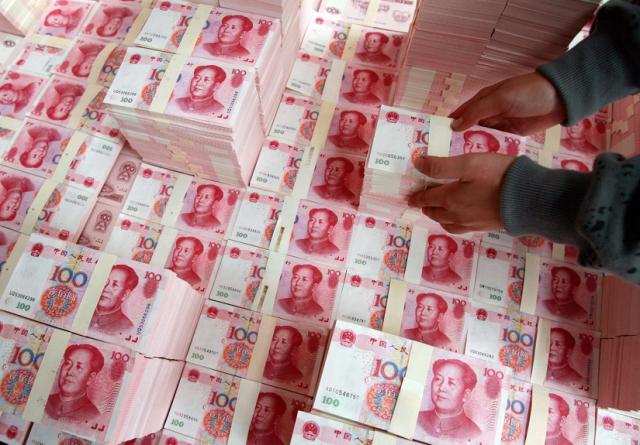Media Report

- The Wall Street Journal reports: "China's battle with risky credit products endures with no victory in sight. It may only get tougher. In its quarterly report published over the weekend, the People's Bank of China said wealth-management products—a form of shadow financing, mostly stashed away off banks' balance sheets—continued to surge, rising 30% on the year to over 26 trillion yuan at the end of 2016. The growth comes even as the central bank has taken to controlling risks—raising rates, balancing liquidity, reining in the growth of M1 money supply...At the current rate of overall asset growth, a swath of China's midtier banks could fail the central bank's new test. If a bank's capital ratio is 4 percentage points lower than the required level, it fails the exam, according to Daiwa analysts. And if wealth-management products grow at even half the rate they did last year, capital ratios could fall below the central bank's new required level. With credit expansion continuing steadily, extracting entrenched risk from Chinese banks is harder than it seems."
- The New York Times comments: "The global order is in disarray. The world is sliding into significant disorder with no international structure capable of handling the kinds of problems that are likely to erupt almost simultaneously. To compound it all, chaos among the major powers could generate truly disastrous consequences...A vulnerable world needs an America characterized by clarity of thought and leadership that projects optimism and progress. 'Make America Great Again' and 'America First' are all very well as bumper stickers, but the foreign policy of the United States needs to be more than a campaign slogan. So we would advise the president to give an address that offers a bold statement of his vision, including his determination to provide America's leadership in the effort to shape a more stable world. This speech should not be a detailed blueprint for American foreign policy, but rather serve as a much-needed reminder that the president of the United States is on watch, is actively engaged and has a sense of historical direction...We may disagree with President Trump on day-to-day decisions, but we urge him to recognize that the ideal long-term solution is one in which the three militarily dominant powers — the United States, China and Russia — work together to support global stability."
- NPR reports: "Malaysia and North Korea are wrangling over whether a man who died at the Kuala Lumpur airport last week is indeed Kim Jong Nam, the estranged half-brother of North Korean leader Kim Jong Un. Among the many countries trying to figure out what to make of it is North Korea's neighbor and sole ally, China. Officially, China has said little except that it is closely monitoring the situation. But in China, Kim Jong Nam's apparent assassination has triggered a debate about what it means and how to respond. Commentator and former journalist Deng Yuwen argues that decades of supporting North Korea has been a losing deal for China, and the assassination of Kim Jong Nam is the perfect opportunity for Beijing to cut its losses. 'In the past, whatever North Korea would do, China would pick up the tab for it. The cost was huge, but the pay-off was next to nothing,' Deng said...Avoiding that conflict could have altered the path of China's development, Deng says, and possibly allowed Beijing to end the Chinese civil war by seizing Taiwan from Chiang Kai-shek, who retreated to the island with his defeated nationalist troops in 1949. Despite all this, North Korea has ignored Beijing's warnings not to proceed with its nuclear and ballistic missile programs."
Calendar
- 2017-02-19 US carrier starts 'routine' patrols in South China Sea
- 2017-02-17 Tillerson Urges China to Confront North Korean Provocations
- 2017-02-16 How Americans and Chinese view their countries and each other, in three charts
- 2017-02-15 Killing of Kim Jong Un’s Brother Intrigues North Korea’s Estranged Ally China
- 2017-02-14 China's credit growth poses challenge, but tightening seen gradual
- 2017-02-13 North Korea: missile test success claim as China rejects US criticism
- 2017-02-12 RPT-China gets an early win off Trump, but many battles remain
- 2017-02-10 Beijing’s Patience Pays Off With Trump’s Reaffirmation of ‘One-China’ Policy
- 2017-02-09 China Praises Trump's Letter to Xi, Belated Well-Wishes
- 2017-02-08 Task force backs Trump’s tough line on China trade
News
- The Wall Street Journal Chinese Bank Cleanup Plan Could Leave a Mess
- NPR China Monitors Assassination Probe Of North Korean Kim Jong Nam
- Bloomberg Alibaba Deepens Retail Foray With New Chinese Supermarket Tie-Up
- The Financial Times EU sets collision course with China over 'Silk Road' rail project
- Reuters Chinese news agency warns South Korea's Lotte over THAAD
- NPR The Burning Problem Of China's Garbage
- Reuters Inbound China M&A takes flight on consumer promise
- The New York Times 'The Great Wall' Topples at North American Box Office
- Bloomberg Panic Over China Is So Last Year, With Market Swings Subsiding
- The Associated Press CEFC China Energy wins 4 percent stake in UAE oil project
- The Financial Times China to slash drug distribution groups in price drive
- BBC Cameroon and Nations Cup star Bassogog moves to China
- The Associated Press Recent developments surrounding the South China Sea
Commentary
- The New York Times: Opinion Page Why the World Needs a Trump Doctrine
- Quartz A British judge in Hong Kong is one of China's most hated people on the internet
- Al Jazeera: Opinion Red Alert for China's pollution protesters
- The Atlantic Taiwan and the Trumpian Uncertainty Principle
- Fortune The Arms Export Business Is One That President Trump Doesn't Have to Worry About
- The National Interest When America Threatened to Nuke China: The Battle of Yijiangshan Island
- Forbes Will Foreign Superstars Help Realize Xi Jinping's Chinese Football Dream?
